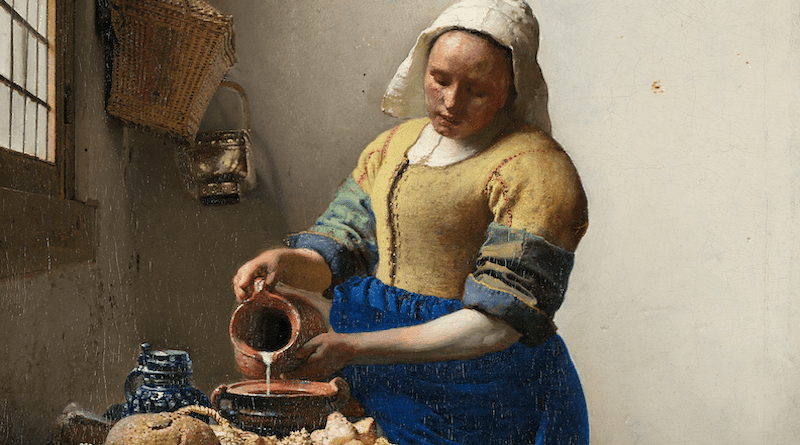Vermeer’s ‘Frugal Woman’ – Essay
A painting of “The Milkmaid” by Dutch painter Johannes Vermeer hangs in our kitchen. We bought it from the sales shop of the Amsterdam Museum, where the original is. The painting depicts a strong domestic kitchen maid, with muscular arms, carefully pouring milk into a container very slowly without wasting it.
Of course, you remember the painting “The Girl With The Pearl Earring,” it was even filmed, but I think this picture is more important.
Winter is coming to Prinkipo island near Istanbul (Büyükada), the weather is getting cold, there is no natural gas in our little summer house on Kadıyan slope, there is no combi boiler, I am sitting in a sweater. It is necessary to develop suggestions to use less natural gas and less electricity in winter.
For example, common hot water should be given once or twice a week in houses, the ambient temperature should be kept at 18C, people should wear slippers, wool socks, sweaters inside the house.
Russia is cutting off the gas it gives to Europe. While Germany boasts solar and wind resources, this upcoming winter it will be cold, bringing with it austerity measures.
Night lighting has already been reduced in Europe, and shop window lighting has been turned off. I spent the year 1971 in England, there was an electric stove in my hostel room, we used to throw money to operate in order to break the cold in the evenings, I slept under two blankets at night, we always wore sweaters and cardigans. How did the British live during the war? They were already very frugal people, they continued after the war.
However, England is not dependent on Russia for natural gas, it has its own north sea resources, but frugality is a very important quality for them. Most homes in the UK do not have heating. Only the room you are in is heated. At night they are all closed. This is the case in all houses, rich or poor. It is the same in the royal’s palace. The reasons for this difference in life should be investigated.
In our houses, the paid workers water the garden every day, then they make noise all day wit lawn mowers, all the energy lost, better to keep the pine trees as they are.
High-rise buildings in Istanbul, the rough construction of which is finished, are illuminated with fancy lights at night. Waste of money, waste of energy.
I was in Moscow in the winter of 1976, the walls of the buildings were very thick stone structures, we went everywhere by subway, there was central heating everywhere, the interiors were warm, there was no shortage of energy, but there were rational savings, there was no waste.
In our houses, tea is made, the kettle stands on the burning stove for hours, we drink a glass of tea, I boil water with a kettle, I brew in a thermos, no one likes it.
In the machinery factory where I worked, there were high, wide and long halls. Steam air fans sent hot air in each column. We were cold in winter, but we had woolen clothes and thick boots on our feet. All heat was wasted.
Europe, and especially Germany. have taken successful steps in fomenting renewable energy. Although Germany gets less sun than us in Turkey, their roof solar energy systems are advanced. Unfortunately, our situation is at the wrong level.
When there is so much solar radiation in Turkey, it is very strange for me to generate our water and heat with the gas coming from one end of the world, from Siberia or Algeria.
Every time I turn the hot water on when I put the teapot on the stove, I always think of this awkward situation and it reminds me that what we are doing is not rational.
Compared to 30-40 years ago, the cost of providing electricity and heating from the sun has decreased and its feasibility has increased.
Germany is to the north of us, however, when viewed from the air, there is almost no roof without solar panels or collectors.
We urgently need a smart energy saving policy. 40 years ago, natural gas was the savior for Ankara’s polluted air. But now I think we should be more rational about natural gas.

